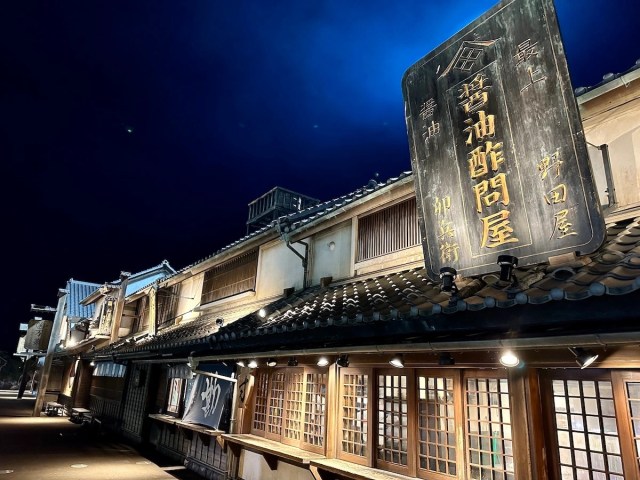
Both the setting and the unique meals here will whisk you away to traditional Japan.
Just the other day, our Japanese-language reporter Masanuki Sunakoma stopped at the Hanyu Parking Area along the Tohoku Expressway in Hanyu City, Saitama Prefecture, and got the surprise of his life.
For starters, parking areas are generally known for being smaller and more bare-bones than service areas on the highway, so he was expecting to see nothing more than a restroom and maybe a few vending machines. However, when he pulled into the complex, the entrance to the restrooms revealed this would be no ordinary parking area.
That’s right — just outside the restrooms was a traditional Japanese gate, beautifully designed to look like something straight out of the Edo period (1603-1867).
Before stepping out of the car, Masanuki pulled out his smartphone and did a quick search online, where he found that this parking area was created in collaboration with Onihei Hankacho, a series of historical novels written by Japanese author Shotaro Ikenami that has since been adapted into movies, plays, manga, anime and a long-running television drama broadcast from 1989 to 2016.
In December 2013, the parking area reopened with the new historical design, and a new name — Onihei Edodokoro. Onihei (“Demon Heizo”) was the intimidating name given to Heizo Hasegawa, a historical figure who was head of a special police force for arson and theft during the Edo period. Having come from a chequered background himself, he was hard on thieves but compassionate to those who committed crimes out of necessity, even establishing a vocational training school for criminals.
▼ Onihei Edodokoro translates to “Demon Heizo Edo District“.
The reason why this parking area was chosen for this special historical collaboration is due to the fact that it’s close to the Kurihashi Checkpoint. Today’s Tohoku Expressway is a modern-day version of the Nikko-kaido (Nikko highway) and the Oshu kaido, two major highways of the Edo Period, and checkpoints once dotted this route. Authorities would check the documents of travellers at these points, enforcing travel rules imposed by the ruling Tokugawa Shogunate to protect them against any revolts from the public.
With the Kurihashi Checkpoint acting as a reminder of the area’s link to Japan’s Edo past, the Hanyu Parking Area has been set up to transport modern-day travellers back to that time period. Specifically, the complex is designed to replicate the timespan from 1745, when Onihei was born, to 1829, when the common people of Edo flourished.
Onihei was known for his love of food, and the parking area pays homage to this passion with shops modelled on ones mentioned in the novels, all serving up “meals that Onihei would’ve found delicious”.
There are plenty of food joints here, each featuring unique nods to the Edo period, with posters that read “Onihei Edodokoro” along the way.
It’s a bit like a theme park, only here there’s no admission fee as entry is completely free. The atmosphere also changes every now and then, thanks to the “sky” installation that switches from day to night modes, and the chatter of vendors, which really helps to make you feel like you’re walking through an Edo-period town.
With so many tasty meals on offer, it was hard to decide which one to settle on, but Masanuki eventually opted for the Hiroshima-style Okonomiyaki Taiyaki from the Bunraku Yaki Honpo taiyaki store.
As he watched the staff make the taiyaki, placing bacon on top of cabbage for the savoury filling before piling on yakisoba noodles, Masanuki’s stomach began to rumble in anticipation.
It only took about five minutes to make, and once he received his piping-hot taiyaki, which is usually filled with sweet red bean paste, he took it over to a table to eat.
When he took the taiyaki out of the bag, he was pleasantly surprised to find it was a big serving, making it a great deal for just 280 yen (US$2.18).
The taiyaki looked delicious, and it tasted delicious too. Though Masanuki had never thought to pair taiyaki with a savoury filling like this before, he loved the way the sweet cake-like casing complemented the salty bacon and cabbage-and-noodle filling.
▼ It’s true — this is a meal that Onihei would’ve given a big thumbs-up to.
If Masanuki knew a place like this existed along the highway, he would’ve arrived on an empty stomach so he could enjoy even more tasty offerings. Alas, the taiyaki was now filling up his belly nicely so he would just have to make a return trip in future, perhaps when renovation work starts up again at our cheap house in the countryside, which cost us less than $10,000!
Reference: Onihei Edodokoro
Images © SoraNews24
● Want to hear about SoraNews24’s latest articles as soon as they’re published? Follow us on Facebook and Twitter!
[ Read in Japanese ]